Table of Contents
TLDR: Udacity vs edX
If it’s a technology-related course you’re after, you will find an array of options on both Udacity and edX. However, if an accredited qualification is also important to you, edX is going to tick both your boxes. As an added bonus, if you had to decide that a technology course is not right for you, there are a lot more topics to choose from.
Then there’s the learning schedule. Because edX has partnered with some of the world’s leading universities, chances are, you’re going to need to follow a stricter learning schedule – this isn’t the case with Udacity. If you’re already working and have limited time available, a course from Udacity will be easier to fit into your weeekly to-do list.
Lastly, there’s the price. Both Udacity and edX can get pricey, but there is also a selection of free courses to choose from too.
We go into more detail on Udacity vs edX below.
Udacity vs edX: Who Is It For?
Udacity
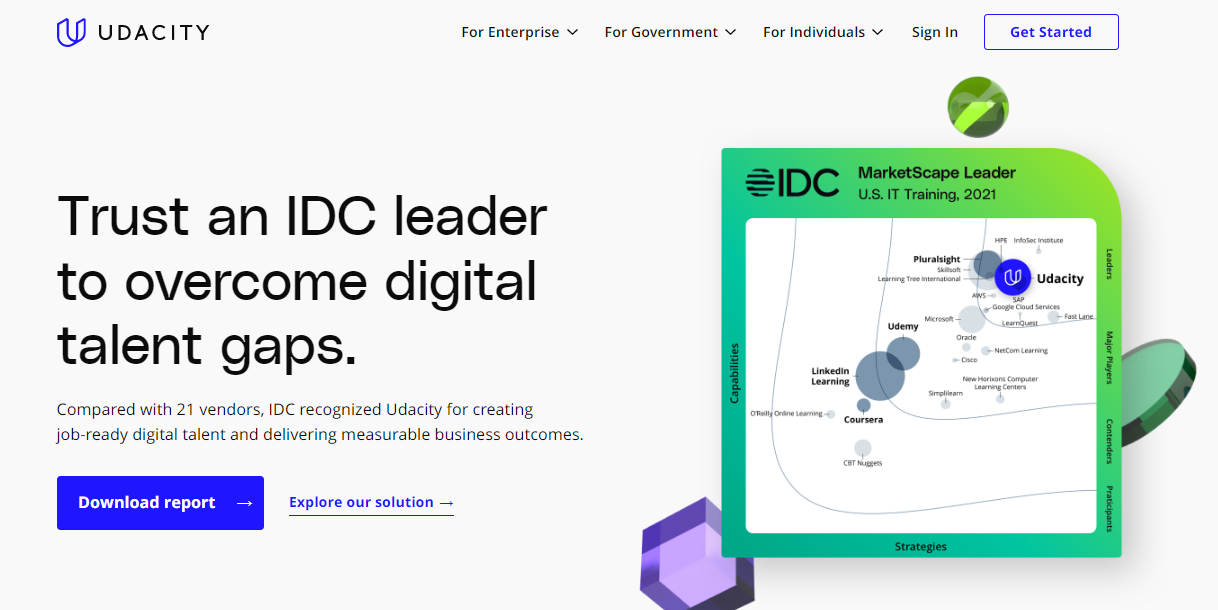
Udacity is a great online learning platform for anyone who appreciates technology-related subjects like web development, AI, software development, and data analytics. The site offers plenty of options for complete beginners who wish to enhance their skills or kickstart a new career. Most of the content is based on real-world projects, making it an excellent platform for people who are practical learners.
edX

edX is ideal for anyone looking for higher education courses specifically. The platform offers thousands of courses and programs in partnership with the world’s top universities and organizations.
The variety of courses and programs make edX suitable for a broader audience, which isn’t the case with Udacity. It’s also a platform for more serious learning. So if you’re ready to commit to a course and don’t mind working towards deadlines, you’ll certainly like edX. This applies to professionals looking to gain new skills, students, and everyone who’s on the lookout for comprehensive online courses.
Udacity vs edX: Types of Courses Offered
Udacity
Udacity mostly offers courses centered around technology. Here are some of the categories you can expect:
- Artificial Intelligence
- Cloud Computing
- Autonomous Systems
- Data Science
- Business
- Cybersecurity
- Product Management
- Programming and Development
Each of the categories also have sub-categories, which list courses for students of every level. For example, the subcategories for the Cybersecurity section include:
- Introduction to Cybersecurity (Beginner)
- Security Analyst (Intermediate)
- Security Engineer (Intermediate)
- Enterprise Security (Intermediate)
- Security Architect (Intermediate)
- Ethical Hacker (Expert)
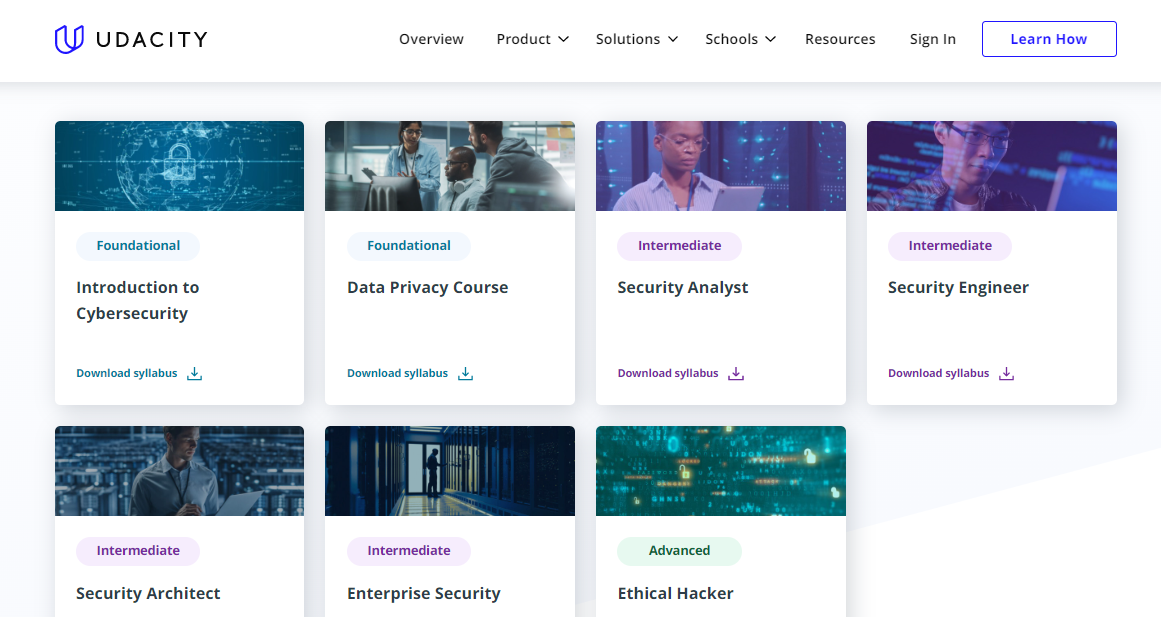
Udacity also has an extra Careers category that consists of practical courses on how to prepare for your job interview in the tech industry.
The paid, premium courses on Udacity are known as Nanodegrees, which include video classes and human-grade projects that you need to complete in order to finish the course successfully and receive a certificate.
Courses on Udacity last anywhere from 2 – 6 months.
Is Udacity Accredited?
Udacity isn’t an accredited educational institution despite having tons of professional programs. You can add the certificates you receive to your resume, but they won’t count toward college credit.
edX
edX has more than 2,000 courses from the world’s most renowned universities, including Harvard, Boston University, Berkeley, and many others. There are currently 31 subject categories on the platform, with some of the more popular ones including:
- Computer Science
- Business and Management
- Economics and Finance
- Data Analysis
- Science
- Communication
- Biology and Life Sciences
- Engineering
- Math
- History
- Social Sciences
- Environmental Studies
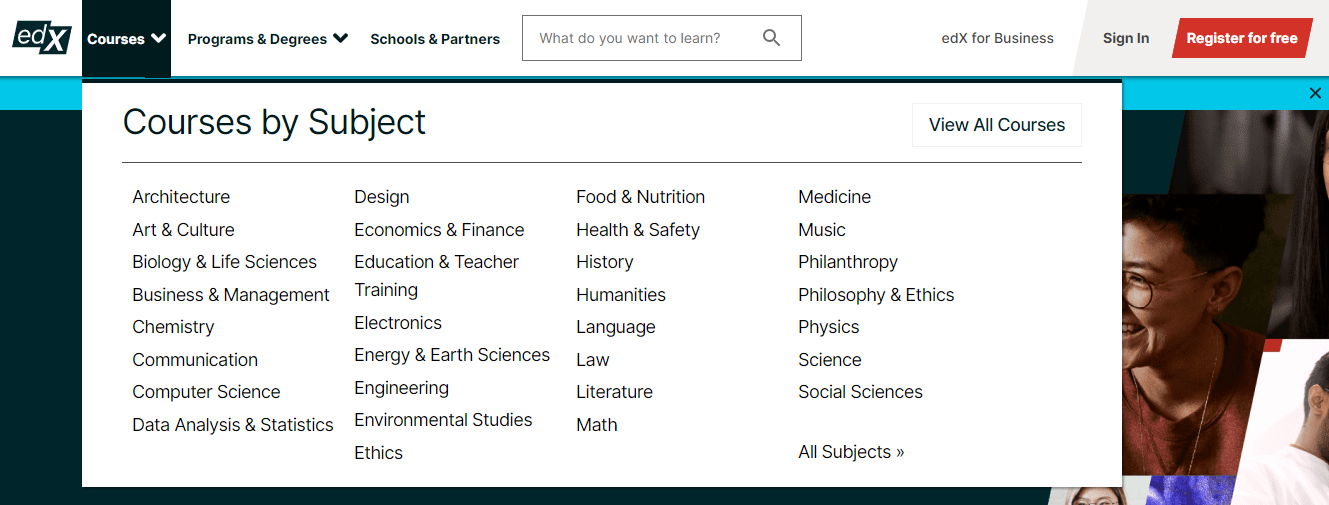
Other categories include chemistry, architecture, food and nutrition, literature, law, electronics, and more.
As you can see, edX courses have a far broader learning scope compared to Udacity, which is mainly technology-focused. They also offer programs in far more languages (25 available), some of which include:
- English
- French
- Russian
- Spanish
- Italian
- Chinese
- German
- Arabic
You can choose between individual paid or free courses, but also from the platform’s signature programs:
- Master’s Degrees. edX’s partnerships with the world’s most renowned universities have allowed it to create special online master’s degree programs in computer science, business management, nutrition, data analytics, and more.
- MicroBachelor’s Programs. If you’re looking to move your career forward or start a new career in a promising field, you can explore some of edX’s MicroBachelor’s programs offered by top universities.
- MicroMaster’s Programs. These are graduate-level programs recognized by employers and build on professional skills in some of the most in-demand fields.
- Professional Certificates. This program is also created by partner universities. Completing a course grants students certificates upon completion that they can place on their resumes.
- Boot Camps. If you’re into learning new skills fast, then rigorous training boot camps may ne just the solution for you. These can last up to 24 weeks and are delivered by edX’s top partners.
- XSeries Program. This special program focuses on in-demand subjects taught by industry experts and university professors.
- Executive Education. Finally, Executive edX Education courses are short program series for professionals who wish to polish their career skills.
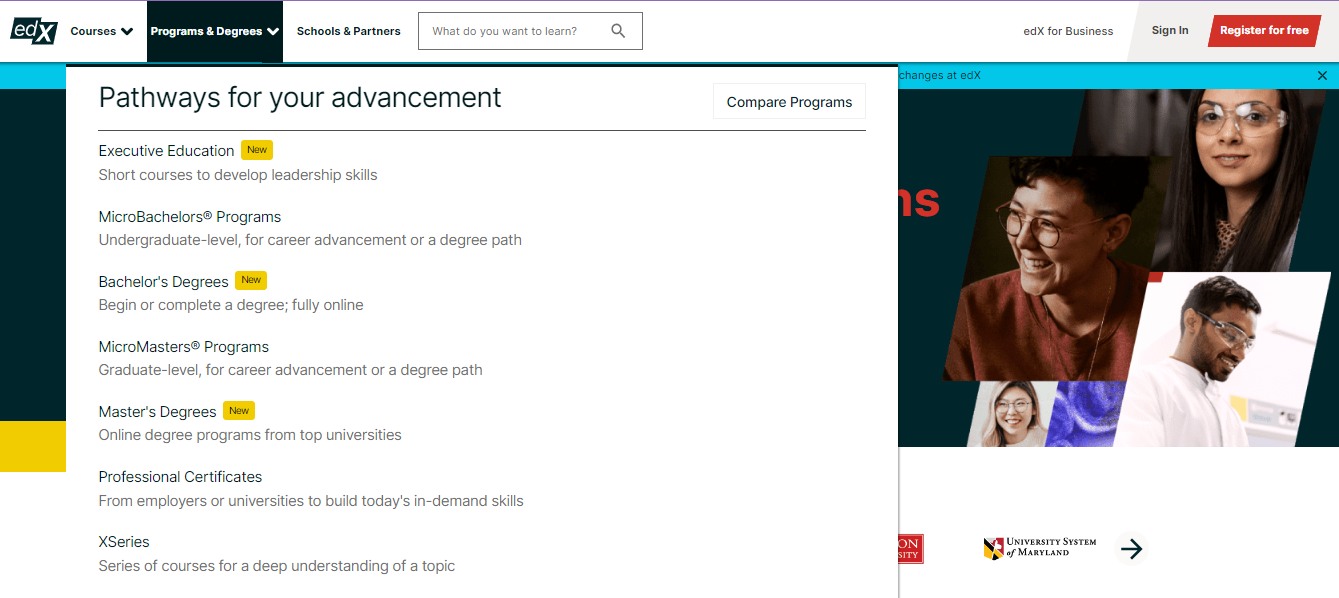
If you’re lucky, you can even audit your favorite course for free. Programs that have this option will have the Audit option featured next to the course name – you won’t receive a certificate if you opt to Audit a course though.
Is edX Accredited?
Some edX courses are accredited, such as MicroMasters and Master’s Degree. Upon completion, you can receive university credit. All other programs aren’t accredited but do offer an edX certificate.
Udacity vs edX: Pricing and Refunds
Udacity
At this point, you may be asking yourself, “So how much does Udacity cost?”
Udacity has different pricing depending on the course. You can choose between free programs, single courses, and Nanodegrees.
Expect to pay around $399 per month for a single course. Their executive programs cost $799 per month and normally take longer to complete. Finally, the Nanodegrees cost around $1000 and grant five-month access. This is just enough time to complete the Nanodegree if you commit to studying ten hours per week. And if you need more time to continue studying, you can get the course as a pay-as-you-go payment option that costs $399 per month.
If you’d like to review a Nanodegree before purchasing, some of them come with a free trial where you can access the learning material and quizzes before committing.
Udacity also offers scholarship programs by some of the world’s biggest companies like AT&T, Google, Lyft, and others.
For students who unenroll within two days of their initial subscription, a refund is possible. You can find all the subscriptions and billing information in your account settings.
If you’d like to cancel a subscription, it’s best to do so before the next billing date. You’ll still be able to access the content until the end of your current billing date.
edX
Many people wonder, “Is edX free?” due to the number of free courses offered on the platform.
But in truth, edX has different pricing plans depending on the course type. The price range is from $0 to more than $30,000 for a single program.
The individual course cost is between $50 and $300.
Here’s a more detailed overview of other programs offered on edX:
- Master’s Degrees – from $9,000 to $25,000
- MicroBachelor’s Programs – from $200 to $3,000+
- MicoMasters Programs – from $500 to $1,500
- Professional Certificate – from $200 to a few thousand dollars
- XSeries – from $200 to $600
edX users are eligible for refunds in the first 14 days of the purchase or beginning of an individual course. If you already received your certificate within 14 days, you can’t receive a refund.
Learners who purchase program bundles can get refunds or switch to other course sessions. These programs also support the 14-day refund policy.
As far as more extensive programs are concerned, you can only receive a refund if you cancel your purchase within the first two days. In this case, you need to contact the edX support team as soon as possible.
Is edX Legit?
The answer is yes – this is a safe and verified platform for online learning.
Udacity vs edX: Enrolment and Usability
Udacity
Udacity is one of the most intuitive and straightforward online learning platforms. You can enroll in a program at any time. You don’t even need to wait until the next course starts to join it.
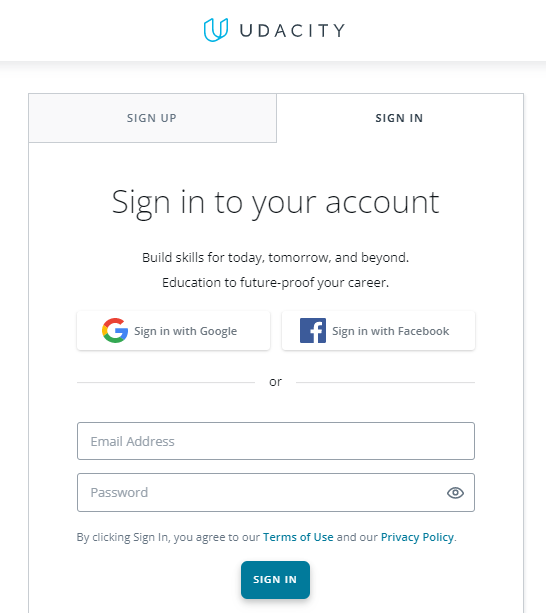
The beautiful interface makes searching for programs and attending courses a fun and interesting experience. When you identify the course you’d like to try out from the course catalog, simply click on it and hit Go to Class.
Students can follow the lectures from their laptops and desktops. There is still no dedicated Udacity app for iOS and Android devices, which may come as a downside to people who need to study on the go.
As far as course pre-requirements are concerned, you don’t have to prove any background experience to start a course. However, you’ll always know whether the program is suited for beginner, intermediate, or expert users.
edX
Signing up for edX is relatively straightforward. You simply have to enter your basic information or sign up using your social media profile.
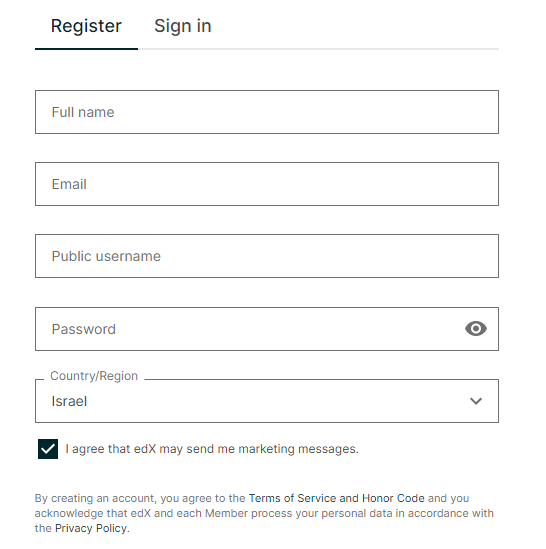
After registration, you’ll be redirected to the edX home page, where you can explore the course catalog. Applying for a course is as easy as clicking a single button Enrol.
You can check their Programs or Courses offers, depending on your needs, or further adjust your search using any of the following filters:
- Subject
- Partner
- Level
- Program
- Availability
- Language
You can also audit courses or attend a free course and pay extra for receiving a certificate. You can upgrade your free course to a premium one whenever you want.
Udacity vs edX: Course Structures
Udacity
All Udacity courses are designed to be highly interactive and intuitive. The lessons consist of pre-recorded videos, reading materials, and other resources. You can learn at your own pace, as there are no deadlines for following the program and turning in assignments.
You’ll often encounter quizzes and exercises between the videos to verify your knowledge.
Once you finish one lesson, you’ll be invited to do activities aimed at reviewing the material you have covered so far. Expect to work on projects like games, building blogs, creating apps, or working with search engines. The projects work on the “learn by doing” model.

edX
edX courses mainly consist of pre-recorded video lectures and reading materials you can complete at your own pace. However, there are also instructor-based programs that come with a fixed schedule and specific due dates.
For self-paced programs, you don’t have a fixed schedule, and the program material is available from the start. You only have to submit the quizzes, tests, and assignments before the end of the course.
Each course comes with a detailed description so you can know what is expected from you as a learner and whether you’ll have to study according to the deadlines or not.
The exact course structure can vary from course to course. Some consist of single exams, while others have plenty of smaller assignments and tests you have to pass.
A typical course duration on edX is from 4 to 12 weeks, given that you study between 4 and 8 hours per week. Also, each course comes with an end date, and you need to complete all assignments by that date if you want to earn a certificate.
Unlike Udacity, edX courses are available on iOS and Android devices so that you can learn on the go.

The Verdict
Udacity and edX both offer excellent learning opportunities for technology-related topics. But if you’d like to tackle any other subject, edX is undoubtedly the better option.
Also, if you plan on using your mobile device to attend classes, you may want to consider edX, given that they have a dedicated app for mobile learning, while Udacity doesn’t. edX is also a better option for professional programs and guided education.
If knowing there are deadlines doesn’t fit in with your schedule. Udacity’s lack of deadlines makes it a better option for casual learners as well as those who are working full-time jobs.
Both platforms offer high-quality programs, but which one you should choose mainly depends on your topic of interest, preferred learning style, and budget.
